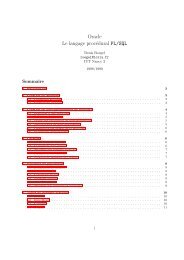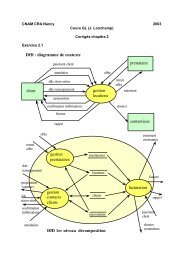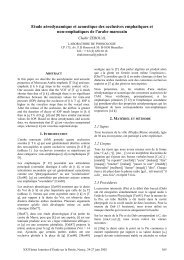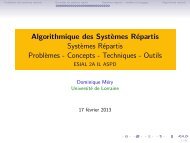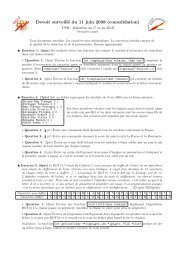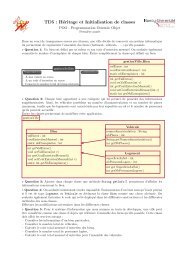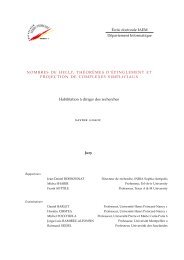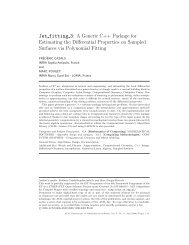Logical Analysis and Verification of Cryptographic Protocols - Loria
Logical Analysis and Verification of Cryptographic Protocols - Loria
Logical Analysis and Verification of Cryptographic Protocols - Loria
You also want an ePaper? Increase the reach of your titles
YUMPU automatically turns print PDFs into web optimized ePapers that Google loves.
154 CHAPTER 6. ON THE GROUND ENTAILMENT PROBLEMS<br />
6.2.1 McAllester’s work<br />
McAllester’s work [150] is based on Horn clauses. He defined a set <strong>of</strong> Horn<br />
clauses S to be subterm local if for every ground Horn clause C, we have S |= C<br />
if <strong>and</strong> only if C is entailed from a set <strong>of</strong> ground instances <strong>of</strong> clauses in S in which<br />
all terms are subterms <strong>of</strong> ground terms in S <strong>and</strong> C. He proved that if a set S <strong>of</strong><br />
Horn clauses is finite <strong>and</strong> subterm local then its ground entailment problem is<br />
decidable.<br />
6.2.2 Basin <strong>and</strong> Ganzinger work<br />
In their work, D. Basin <strong>and</strong> H. Ganzinger [28] generalised McAllester’s work<br />
by allowing arbitrary term ordering, any strict well-founded order over terms,<br />
<strong>and</strong> full (not Horn) clauses. We recall some definitions used by D. Basin <strong>and</strong><br />
H. Ganzinger. A set <strong>of</strong> clauses S is said to be order local with respect to a term<br />
ordering ≻ if for every ground clause C, we have S |= C if <strong>and</strong> only if C is<br />
entailed from a set <strong>of</strong> ground instances <strong>of</strong> clauses in S in which each term is<br />
smaller than or equal (under the �) to some term in C. A term ordering ≻ is<br />
said to be <strong>of</strong> complexity f, g, whenever for each clause <strong>of</strong> size n (the size <strong>of</strong> a<br />
term is the number <strong>of</strong> nodes in its tree representation, <strong>and</strong> the size <strong>of</strong> a clause is<br />
the sum <strong>of</strong> sizes <strong>of</strong> its terms) there exists O(f(n)) terms that are smaller or equal<br />
(under �) to a term in the clause, <strong>and</strong> that may be enumerated in time g(n). It<br />
is easy to see that if ≻ is <strong>of</strong> complexity f, g, each ground term has finitely many<br />
smaller terms that may be enumerated in finite time. D. Basin <strong>and</strong> H. Ganzinger<br />
obtained the following results:<br />
1. If S is a set <strong>of</strong> Horn clauses that is order local with respect to a term ordering<br />
≻ <strong>of</strong> complexity f, g then the ground entailment problem for S is<br />
decidable.<br />
2. If S is a set <strong>of</strong> (full) clauses that is order local with respect to a term ordering<br />
≻ <strong>of</strong> complexity f, g then the disentailment ground problem for S is<br />
decidable.<br />
In [28], D. Basin <strong>and</strong> H. Ganzinger showed that the saturation <strong>of</strong> a set S <strong>of</strong> Horn<br />
clauses <strong>and</strong> hence (full) clauses is not sufficient to obtain the decidability <strong>of</strong> the<br />
ground entailment problem for S. To show this, they considered the following<br />
example. We recall that for arbitrary Horn clause sets, the satisfiability <strong>and</strong><br />
ground entailment problems are undecidable.<br />
Example 22 Let S be an arbitrary set <strong>of</strong> Horn clauses, <strong>and</strong> let S ′ consist <strong>of</strong> the set<br />
<strong>of</strong> Horn clauses q(a), Γ → A such that Γ → A is in S. Choose an ordering ≺ such<br />
that a is the maximal term. For any compatible atom ordering, there is no ordered<br />
inferences from S ′ , <strong>and</strong> hence S ′ is saturated under ordered resolution. It is undecidable<br />
if S ′ |= ¬q(a) since this is equivalent to the inconsistency <strong>of</strong> S.




